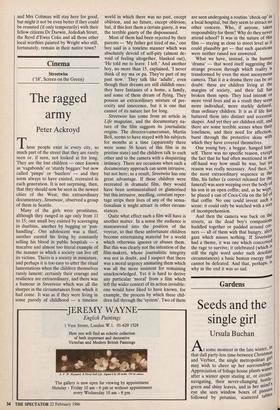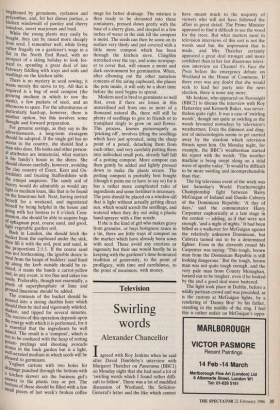Gardens
Seeds and the single girl
Ursula Buchan At some moment in the late winter, in that dull party-less time between Christnil and Verbier, the single metropolitan Pr may wish to cheer up her surroundings' Appreciation of foliage house plants wanes after a winter spent staring at, or circum- navigating, their never-changing bottle: green and shiny leaves, and in her mind s eye she sees window boxes of pansies followed by petunias, scattered tables brightened by geraniums, cyclamen and Polyanthus, and, for her dinner parties, a kitchen windowsill of parsley and cherry tomatoes, sweet marjoram and basil. While the young plants may easily be bought, they can be raised more cheaply from seed. I remember well, while living rather frugally on a gardener's wage in a flat in the North End Road, with no prospect of a skiing holiday to look for- ward to, spending a great deal of late February fiddling with trays and soils and seedlings on the kitchen table. There is no mystery in seed sowing; it wants merely the nerve to try. All that is required is a bag of seed compost (the growing medium in which to sow the seeds), a few packets of seed, and an afternoon to spare. For the adventurous or Particularly hard-up, however, there is another option, but this involves some thought and forward preparation. For genuine savings, as they say in the advertisements, a long-term stratagem should be adopted. If the single girl has no access to the country, she should find a man who does. His looks and other person- al attributes are immaterial, what matters is his family's house in the shires. She should choose carefully, however, avoiding the clay country of Essex, Kent and Ox- fordshire and treating Staffordshire with the utmost suspicion. The sandy soil of Surrey would do admirably as would any light or medium loam, like that to be found on the limestone belt. Next, having invited herself for a weekend, and ingratiated herself by being helpful in the house and going with her hostess to 8 o'clock Com- munion, she should be able to acquire bags of sphagnum peat, coarse sand, and good, light vegetable garden soil. Back in London, she should fetch the bucket from the cupboard under the sink, then fill it with the soil, peat and sand, in the proportions 2:1:1. If the coarse sand Was not forthcoming, the ignoble desire to steal from the heaps of builders' sand lined up along the kerb outside should be re- sisted; it stains the hands a carrot-yellow and, in any event, is too fine and cakes too easily. Preferably, though not essentially, a Pinch of superphosphate of lime and Found limestone should be added.
The contents of the bucket should be Poured into a strong dustbin liner which should then be tied and vigorously whirled, shaken, and tipped for several minutes. The success of this operation depends upon the energy with which it is performed, for it essential that the ingredients be well Mixed. The result is a 'compost', which is not to be confused with the heap of rotting Potato peelings and shooting avocado stones in the back garden but is a light, Well-aerated medium in which seeds will be Pleased to germinate. Yoghurt cartons with two holes for drainage punched through the bottom with kitchen skewer are the business girl's bottom to the plastic tray or pot. The t of these should be filled with a few small pieces of last week's broken coffee mugs for better drainage. The mixture is then ready to - be decanted into these containers, pressed down gently with the base of a sherry glass, and steeped in a few inches of water in the sink till the compost is moist. The seeds can then be sown on its surface very thinly and just covered with a little more compost which has been through the kitchen sieve. Clingfilm stretched over the top, and some newspap- er to cover that, will ensure a moist and dark environment for germination. When, after elbowing out the other nameless contents of the airing cupboard, she places the pots inside, it will only be a short time before the seed begins to sprout.
Modern seed is bred to germinate so well that, even if there are losses in this unsterilised soil from one or more of a thousand natural ills, there will still be plenty of seedlings to give to friends or to transplant singly to grow on and, flower. This process, known picturesquely as 'pricking off, involves lifting the seedlings which have just sprouted, using the sharp point of a pencil, detaching them from each other, and very carefully putting them into individual small pots, already half full of a potting compost. More compost can then gently be added and lightly pressed down to make the plants secure. The potting compost is probably best bought (though it pains me to have to say so) for it has a rather more complicated ratio of ingredients and some fertiliser is necessary. The pots should be placed on a window-sill that is light without actually getting direct sun, which would scorch the seedlings, and watered when they dry out using a plastic hand-sprayer with a fine nozzle. If she is the kind of girl who makes gravy from granules, or buys bolognese sauce in a tin, there are little trays of compost on the market which have already been sown with seed. These avoid any exertion or ingenuity but their use would hardly be in keeping with the gardener's time-honoured tradition of generosity, to the point of profligacy, with time and carefulness, to the point of meanness, with money.















































 Previous page
Previous page